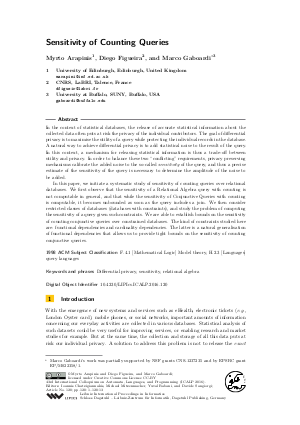Sensitivity of Counting Queries
Authors Myrto Arapinis, Diego Figueira, Marco Gaboardi
-
Part of:
Volume:
43rd International Colloquium on Automata, Languages, and Programming (ICALP 2016)
Part of: Series: Leibniz International Proceedings in Informatics (LIPIcs)
Part of: Conference: International Colloquium on Automata, Languages, and Programming (ICALP) - License:
 Creative Commons Attribution 3.0 Unported license
Creative Commons Attribution 3.0 Unported license
- Publication Date: 2016-08-23
File

PDF
LIPIcs.ICALP.2016.120.pdf
- Filesize: 1.19 MB
- 13 pages
Document Identifiers
Subject Classification
Keywords
- Differential privacy
- sensitivity
- relational algebra
Metrics
- Access Statistics
-
Total Accesses (updated on a weekly basis)
0PDF Downloads0Metadata Views
Abstract
In the context of statistical databases, the release of accurate statistical information about the collected data often puts at risk the privacy of the individual contributors. The goal of differential privacy is to maximise the utility of a query while protecting the individual records in the database. A natural way to achieve differential privacy is to add statistical noise to the result of the query. In this context, a mechanism for releasing statistical information is thus a trade-off between utility and privacy. In order to balance these two "conflicting" requirements, privacy preserving mechanisms calibrate the added noise to the so-called sensitivity of the query, and thus a precise estimate of the sensitivity of the query is necessary to determine the amplitude of the noise to be added. In this paper, we initiate a systematic study of sensitivity of counting queries over relational databases. We first observe that the sensitivity of a Relational Algebra query with counting is not computable in general, and that while the sensitivity of Conjunctive Queries with counting is computable, it becomes unbounded as soon as the query includes a join. We then consider restricted classes of databases (databases with constraints), and study the problem of computing the sensitivity of a query given such constraints. We are able to establish bounds on the sensitivity of counting conjunctive queries over constrained databases. The kind of constraints studied here are: functional dependencies and cardinality dependencies. The latter is a natural generalisation of functional dependencies that allows us to provide tight bounds on the sensitivity of counting conjunctive queries.
Cite As Get BibTex
Myrto Arapinis, Diego Figueira, and Marco Gaboardi. Sensitivity of Counting Queries. In 43rd International Colloquium on Automata, Languages, and Programming (ICALP 2016). Leibniz International Proceedings in Informatics (LIPIcs), Volume 55, pp. 120:1-120:13, Schloss Dagstuhl – Leibniz-Zentrum für Informatik (2016)
https://doi.org/10.4230/LIPIcs.ICALP.2016.120
BibTex
@InProceedings{arapinis_et_al:LIPIcs.ICALP.2016.120,
author = {Arapinis, Myrto and Figueira, Diego and Gaboardi, Marco},
title = {{Sensitivity of Counting Queries}},
booktitle = {43rd International Colloquium on Automata, Languages, and Programming (ICALP 2016)},
pages = {120:1--120:13},
series = {Leibniz International Proceedings in Informatics (LIPIcs)},
ISBN = {978-3-95977-013-2},
ISSN = {1868-8969},
year = {2016},
volume = {55},
editor = {Chatzigiannakis, Ioannis and Mitzenmacher, Michael and Rabani, Yuval and Sangiorgi, Davide},
publisher = {Schloss Dagstuhl -- Leibniz-Zentrum f{\"u}r Informatik},
address = {Dagstuhl, Germany},
URL = {https://drops.dagstuhl.de/entities/document/10.4230/LIPIcs.ICALP.2016.120},
URN = {urn:nbn:de:0030-drops-62552},
doi = {10.4230/LIPIcs.ICALP.2016.120},
annote = {Keywords: Differential privacy, sensitivity, relational algebra}
}
Author Details
References
- Serge Abiteboul, Richard Hull, and Victor Vianu. Foundations of Databases. Addison-Wesley, 1995. URL: http://webdam.inria.fr/Alice/.
- A. V. Aho, C. Beeri, and J. D. Ullman. The theory of joins in relational databases. ACM Trans. Database Syst., 4(3):297-314, September 1979. URL: http://dx.doi.org/10.1145/320083.320091.
- Avrim Blum, Cynthia Dwork, Frank McSherry, and Kobbi Nissim. Practical privacy: The sulq framework. In Proceedings of the Twenty-fourth ACM SIGMOD-SIGACT-SIGART Symposium on Principles of Database Systems, PODS'05, pages 128-138, New York, NY, USA, 2005. ACM. URL: http://dx.doi.org/10.1145/1065167.1065184.
- Swarat Chaudhuri, Sumit Gulwani, Roberto Lublinerman, and Sara Navidpour. Proving programs robust. In Proceedings of the 19th ACM SIGSOFT Symposium and the 13th European Conference on Foundations of Software Engineering, ESEC/FSE'11, pages 102-112, New York, NY, USA, 2011. ACM. URL: http://dx.doi.org/10.1145/2025113.2025131.
- Shixi Chen and Shuigeng Zhou. Recursive mechanism: Towards node differential privacy and unrestricted joins. In Proceedings of the 2013 ACM SIGMOD International Conference on Management of Data, SIGMOD'13, pages 653-664, New York, NY, USA, 2013. ACM. URL: http://dx.doi.org/10.1145/2463676.2465304.
- Cynthia Dwork. Differential privacy. In Automata, Languages and Programming, 33rd International Colloquium, ICALP 2006, Venice, Italy, July 10-14, 2006, Proceedings, Part II, pages 1-12, 2006. URL: http://dx.doi.org/10.1007/11787006_1.
- Cynthia Dwork and Aaron Roth. The algorithmic foundations of differential privacy. Found. Trends Theor. Comput. Sci., 9(3–4):211-407, August 2014. URL: http://dx.doi.org/10.1561/0400000042.
- Marco Gaboardi, Andreas Haeberlen, Justin Hsu, Arjun Narayan, and Benjamin C. Pierce. Linear dependent types for differential privacy. SIGPLAN Not., 48(1):357-370, January 2013. URL: http://dx.doi.org/10.1145/2480359.2429113.
- Sven Hartmann. On interactions of cardinality constraints, key, and functional dependencies. In Foundations of Information and Knowledge Systems, First International Symposium, FoIKS 2000, Burg, Germany, February 14-17, 2000, Proceedings, pages 136-155, 2000. URL: http://dx.doi.org/10.1007/3-540-46564-2_9.
- Daniel Kifer and Ashwin Machanavajjhala. No free lunch in data privacy. In Proceedings of the 2011 ACM SIGMOD International Conference on Management of Data, SIGMOD'11, pages 193-204, New York, NY, USA, 2011. ACM. URL: http://dx.doi.org/10.1145/1989323.1989345.
- David Maier, Alberto O. Mendelzon, and Yehoshua Sagiv. Testing implications of data dependencies. ACM Trans. Database Syst., 4(4):455-469, December 1979. URL: http://dx.doi.org/10.1145/320107.320115.
- Frank D. McSherry. Privacy integrated queries: An extensible platform for privacy-preserving data analysis. In Proceedings of the 2009 ACM SIGMOD International Conference on Management of Data, SIGMOD'09, pages 19-30, New York, NY, USA, 2009. ACM. URL: http://dx.doi.org/10.1145/1559845.1559850.
- Kobbi Nissim, Sofya Raskhodnikova, and Adam Smith. Smooth sensitivity and sampling in private data analysis. In Proceedings of the Thirty-ninth Annual ACM Symposium on Theory of Computing, STOC'07, pages 75-84, New York, NY, USA, 2007. ACM. URL: http://dx.doi.org/10.1145/1250790.1250803.
- Catuscia Palamidessi and Marco Stronati. Differential privacy for relational algebra: Improving the sensitivity bounds via constraint systems. In Proceedings 10th Workshop on Quantitative Aspects of Programming Languages and Systems, QAPL 2012, Tallinn, Estonia, 31 March and 1 April 2012., pages 92-105, 2012. URL: http://dx.doi.org/10.4204/EPTCS.85.7.
- Jason Reed and Benjamin C. Pierce. Distance makes the types grow stronger: A calculus for differential privacy. In Proceedings of the 15th ACM SIGPLAN International Conference on Functional Programming, ICFP'10, pages 157-168, New York, NY, USA, 2010. ACM. URL: http://dx.doi.org/10.1145/1863543.1863568.
